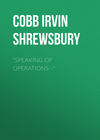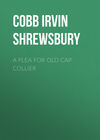Kitabı oku: «The Glory of the Coming», sayfa 12
“Oh, but this will never do – never!” stated the inspecting lady. “It is too bare, too cheerless! It lacks atmosphere. It lacks coziness; it lacks any appeal to the senses – in short it lacks everything! We must have some immediate improvements here by all means.”
The man was beginning to lose his temper. By an effort he retained it.
“The men seem fairly well satisfied; at least I have heard no complaint,” he said. “What would you suggest in the way of changes?”
As she answered, the visitor ticked off the items of her mental inventory of essentials on her fingers.
“Well, to begin with we must clear all this litter out of here,” she said. “Then we must install some really comfortable chairs and at least two or three roomy sofas and some simple couches where the men may lie down. I should also like to see a piano here. That, with the addition of some curtains at the windows and some simple treatment of the walls and a few appropriate pictures properly spaced and properly hung, will be different, I think.”
“Yes,” demurred the manager, “but admitting that we could get the things you have enumerated up here, another problem would arise: This room, which, as you see, is not large, would be so crowded with the furnishings that there would be room in it for very many less men than usually come here. There are probably fifty men in it now. If it were filled up with sofas and couches and a piano I doubt whether we could crowd twenty men inside of it.”
“Very well, then,” stated the lady decorator calmly, “you must admit only twenty men at a time.”
“Quite so; but how,” he demanded – “how am I going to select the twenty?”
The young woman considered the question for a moment. Then a solution came to her.
“I should select the twenty neatest ones,” she said.
Whereupon the manager excused himself and went out to frame a dispatch to headquarters embodying an ultimatum, which ultimatum was that the lady decorator went away from there forthwith or his resignation must take effect, coincident with his immediate departure from his present post. The home office must have called the lady off, because when I saw him he was still in harness, and swinging a man-size job in a competent way.
I would not have the reader believe that I am casting discredit upon either the patriotic impulses or the honest motives of the bulk of the lay workers who have journeyed to Europe, paying their own way and their own living expenses. Often they arrive, many of them, to strike hands with the military authorities in the task which faces our nation on Continental soil. There is room and a welcome in France, in Italy, in England and in Flanders for every civilian recruit who really knows how to do something helpful and who has the strength, the self-reliance and the hardihood to perform that particular function under difficult and complicated conditions, which nearly always are physically uncomfortable and which may become physically dangerous.
Nor would I wish any one to assume that I am deprecating by inference or by frontal attack the very fine things that are being accomplished every day by fine American women and girls who answered the first call for trained helpers, to serve in hospitals or canteens or huts, in settlement work or at telephone exchanges. It will make any American thrill with pride to enter a ward where the American Red Cross is in charge, or where a medical unit from one of the great hospitals or one of our great universities back home has control. The French and the British are quick enough to speak in terms of highest praise of the achievements of American surgeons, American nurses and American ambulance drivers. They say, and with good reason for saying it, that our people have pluck and that they have skill and that they above all are amazingly resourceful.
Personally I know of no smarter exhibition of native wit and courage that the war has produced than was shown by that group of Smith College girls who had been organising and directing colonisation work among the peasants in the reclaimed districts of Northern France and who were driven out by the great spring advance of the Germans. I met some of those young women. They were modest enough in describing their adventure. It was by gathering a shred of a story there and a scrap of an anecdote here that I was able to piece together a fairly accurate estimate of the self-imposed discipline, the clean-strained grit and the initiative which marked their conduct through three trying weeks.
Perhaps it was a mistake in their instance, as in the instances of divers similar organisations, that the work of resettling the wasted lands above the Aisne and the Oise should have been undertaken at points that would be menaced in the event of a quick onslaught by the Prussian high command. The British, I understand, privately objected to the undertakings on the ground that the presence of American women In villages which might fall again into the foe’s hands – and which as it turned out did fall again into his hands – entailed an added burden and an added responsibility upon the fighting forces. The British were right. Practically all of the repatriated peasants had to flee for the second time, abandoning their rebuilt homes and their newly sowed fields.
On the heels of these, improvements which represented many thousands of American dollars and many months of painstaking labour on the part of devoted American women went up in flames. The torch was applied rather than that the little model houses and the tons of donated supplies on hand should go into hostile hands.
Those Smith College girls did not run away, though, until the Germans were almost upon them. Up to the very last minute they stayed at their posts, feeding and housing not only refugees but many exhausted soldiers, British and French, who staggered in, spent and sped after alternately fighting and retreating through a period of days and nights. When finally they did come away each one of them came driving her own truck and bearing in it a load of worn-out and helpless natives. One girl brought out a troop of frightened dwarfs from a stranded travelling caravan. Another ministered day and night to a blind woman nearly ninety years old and a family of orphaned babies. The passengers of a third were four inmates of a little communal blind asylum that happened to be in the invader’s path.
On the way, in addition to tending their special charges, they cooked and served hundreds of meals for hungry soldiers and hungry civilians. They spent the nights in towns under shell fire, and when at length the German drive had been checked they assembled their forces in Beauvais. Thus and with characteristic adaptability some became drivers of ambulances and supply trucks plying along the lines of communication, and some opened a kitchen for the benefit of passing soldiers at the local railway station. If the faculty and the students and the alumnæ of Smith College did not hold a celebration when the true story of what happened in March and April reached them they were lacking in appreciation – that’s all I have to say about it.
Right here seems a good-enough place for me to slip in a few words of approbation for the work which another ‘organisation has accomplished in France since we put our men into the field. Nobody asked me to speak in its favour because so far as I can find out it has no publicity department. I am referring to the Salvation Army – may it live forever for the service which, without price and without any boasting on the part of its personnel, it is rendering to our boys in France!
A good many of us who hadn’t enough religion, and a good many more of us who mayhap had too much religion, look rather contemptuously upon the methods of the Salvationists. Some have gone so far as to intimate that the Salvation Army was vulgar in its methods and lacking in dignity and even in reverence. Some have intimated that converting a sinner to the tap of a bass drum or the tinkle of a tambourine was an improper process altogether. Never again, though, shall I hear the blare of the cornet as it cuts into the chorus of hallelujah whoops where a ring of blue-bonneted women and blue-capped men stand exhorting on a city street corner under the gas lights, without recalling what some of their enrolled brethren – and sisters – have done and are doing in Europe.
The American Salvation Army in France is small, but, believe me, it is powerfully busy! Its war delegation came over without any fanfare of the trumpets of publicity. It has no paid press agents here and no impressive headquarters. There are no well-known names, other than the names of its executive heads, on its rosters or on its advisory boards. None of its members is housed at an expensive hotel and none of them has handsome automobiles in which to travel about from place to place. No compaigns to raise nation-wide millions of dollars for the cost of its ministrations overseas were ever held at home. I imagine it is the pennies of the poor that mainly fill its war chest.
I imagine, too, that sometimes its finances are an uncertain quantity. Incidentally I am assured that not one of its male workers here is of draft age unless he holds exemption papers to prove his physical unfitness for military service. The Salvationists are taking care to purge themselves of any suspicion that potential slackers have joined their ranks in order to avoid the possibility of having to perform duties in khaki.
Among officers as well as among enlisted men one occasionally hears criticism – which may or may not be based on a fair judgment – for certain branches of certain activities of certain organisations. But I have yet to meet any soldier, whether a brigadier or a private, who, if he spoke at all of the Salvation Army, did not speak in terms of fervent gratitude for the aid that the Salvationists are rendering so unostentatiously and yet so very effectively. Let a sizable body of troops move from one station to another, and hard on its heels there came a squad of men and women of the Salvation Army. An army truck may bring them, or it may be they have a battered jitney to move them and their scanty outfits. Usually they do not ask for help from any one in reaching their destinations. They find lodgment in a wrecked shell of a house or in the corner of a barn. By main force and awkwardness they set up their equipment, and very soon the word has spread among the troopers that at such-and-such a place the Salvation Army is serving free hot drinks and free doughnuts and free pies. It specialises in doughnuts, the Salvation Army in the field does – the real old-fashioned homemade ones that taste of home to a homesick soldier boy.
I did not see this, but one of my associates did. He saw it last winter in a dismal place on the Toul sector. A file of our troops were finishing a long hike through rain and snow over roads knee-deep in half-thawed icy slush. Cold and wet and miserable, they came tramping into a cheerless, half-empty town within sound and range of the German guns. They found a reception committee awaiting them there – in the person of two Salvation Army lassies and a Salvation Army captain. The women had a fire going in the dilapidated oven of a vanished villager’s kitchen. One of them was rolling out the batter on a plank with an old wine bottle for a rolling pin and using the top of a tin can to cut the dough into circular strips. The other woman was cooking the doughnuts, and as fast as they were cooked the man served them out, spitting hot, to hungry wet boys clamouring about the door, and nobody was asked to pay a cent.
At the risk of giving mortal affront to ultra-doctrinal practitioners of applied theology I am firmly committed to the belief that by the grace of God and the grease of doughnuts those three humble benefactors that day strengthened their right to a place in the Heavenly Kingdom.
As I said a bit ago, there is in France room and to spare and the heartiest sort of welcome for competent, sincere lay workers, both men and women. But there is no room, and if truth be known, there is no welcome for any other sort. These people over here long ago passed out of the experimental period in the handling of industrial and special problems that have grown up out of war. They have entirely emerged from the amateur stage of endeavour and direction. If any man doubts the truth of this he has only to see, as I have seen, the thousands of women who have taken men’s jobs in the cities in order that the men might go to the colours; has only to see the overalled women in the big munition plants; has only to see how the peasant women of France are labouring in the fields and how the girls of the British auxiliary legions – the members of the W. A. A. C. for a conspicuous example – are carrying their share of the burden; has only to see women of high degree and low, each doing her part sanely, systematically and unflinchingly – to appreciate that, though Britain and France can find employment for every pair of willing and able hands somewhere behind the lines, they have no use whatsoever for the unorganised applicant or for the purely ornamental variety of volunteer or yet for the mere notoriety seeker.
I make so bold as to suggest that it is time we were taking the same lesson to heart; time to start the sifting process ourselves. I have seen in Paris a considerable number of American women who appeared to have no business here except to air their most becoming uniforms in public places and to tell in a vague broad way of the things they hope to do. The French, proverbially, are a polite race, and the French Government will endure a great deal of this kind of infliction rather than run the risk of engendering friction, even to the most minute extent, with the people or the administration of an Allied nation. But in wartime especially, too much patience becomes a dubious virtue, and if practiced for overlong may become a fault.
As yet there has been no intimation from any official source that the French would rather our State Department did not issue quite so many passports to Americans who have no set and definite purpose in making the journey to these shores, but even a superficial knowledge of the French language and the most casual acquaintance with the French nature enable one to get at what the French people are thinking. I am sure that had the prevalent condition been reversed our papers would have voiced the popular protest at the imposition long before now. Some of these days, unless we apply the preventive measures on our own side of the Atlantic, the perfectly justifiable resentment of the hard-pressed French is going to find utterance; and then quite a number of well-intentioned but utterly inutile persons will be going back home with their feelings all harrowed up.
CHAPTER XVI. CONDUCTING WAR BY DELEGATION
PLEASE do not think that because I have mainly dwelt thus far upon the women offenders that there are no American men in France who do not belong here, because that would be a wrong assumption. I merely have mentioned the women first because by reason of their military garbing – or what some of them fondly mistake for military garbing – they offer rather more conspicuous showing to the casual eye than the male civilian dress.
The men are abundantly on hand though; make no mistake about that! Some of them come burdened with frock-coated dignity as members of special commissions or special delegations; in certain quarters there appears to be a somewhat hazy but very lively inclination to try to run our share of this war by commission. Some, I am sure, came for the same reason that the young man in the limerick went to the stranger’s funeral – because they are fond of a ride. Some I think came in the hope of enjoying an exciting sort of junketing expedition, and some because they were all dressed up and had nowhere to go.
As well as may be judged by one who has been away from home for going on five months now, the special-commission notion is being rather overdone. Individuals and groups of individuals bearing credentials from this fraternal organisation or that religious organisation or the other research society reach England on nearly every steamer that penetrates through the U-boat zone. Almost invariably these gentlemen carry letters of introduction testifying to their personal probity and their collective importance, which letters are signed by persons sitting in high places.
It may be that the English are thereby deceived into believing that the visitors are entitled to special consideration – as indeed some of them are, and indeed some of them most distinctly are not. Or then again it may be that the English are not aware of a device very common among our men of affairs for getting rid of a bore who is intent on going somewhere to see somebody and craves to be properly vouched for upon his arrival. In certain circles this habit is called passing the buck. In others it is known as writing letters of introduction.
At any rate the English take no chances on offending the right party, even at the risk of favouring the wrong one. When a half dozen Yankees appear at the Foreign Office laden with letters addressed “To Whom it May Concern” the Foreign Office immediately becomes concerned.
How is a guileless Britisher intrenched behind a flat-top desk to know that the August and Imperial Order of Supreme Potentates whose chosen emissaries are now present desirous of having a look at the war, and afterward to approve of it in a report to the Grand Lodge at its next annual convention, if so be they do see fit to approve of it – how, I repeat, is he to know that the August and Imperial Order of Supreme Potentates has a membership largely composed of class-C bartenders? Not knowing, he acts in accordance with the best dictates of his ignorance.
The commission or the delegation or the presentation, whatever it calls itself, is provided with White Passes all round. On the strength of these White Passes the investigators are at the public expense transferred across the Channel and housed temporarily at the American Visitors’ Château. From there they are taken in automobiles and under escort of very bored officers on a kind of glorified Cook’s tour behind the British Front. Thereafter they are turned over to the French Mission or to the American forces for similar treatment.
As a result they accumulate an assortment of soft-boiled and yolkless impressions which they incubate into the spoken or the written word on the way back home, after they have held a meeting to decide whether they like the way the war is going on or whether they do not like the way the war is going on. Always there is the possibility that as a result of the dissemination of underdone and undigested misinformations which they have managed to acquire these persons, though actuated by the best intentions in the world, may do considerable harm in shaping public opinion in America. And likewise one may be very sure a lot of pestered British and French functionaries are left to wonder what sort of folks the masses of American citizenship must be if these are typical samples of the thought-moulding class.
I am not exaggerating much when I touch on this particular phase of the topic now engaging me, for I have seen two delegations in Europe, of the variety I have sought briefly to describe in the lines immediately foregoing; and we are expecting more in on the next boat. There was no imaginable reason why those whom I saw should be in a country that is at war at such a time of crisis as this time is, but the main point was that they were here, eating three large rectangular meals a day apiece and taking up the valuable time of overworked military men who accompanied them while they week-ended at the war. How many more such delegations will sift through the State Department and seep by the passport bureau and journey hither during the latter half of 1918 unless the Administration at Washington shuts down on the game no man can with accuracy calculate.
Away down in the south of France I ran into a gentleman of a clerical aspect who lost no time in telling me about himself. He was tall and slender like a wand, and of a willowy suppleness of figure, and he was terribly serious touching on his mission. He represented a religious denomination that has several hundreds of thousands of communicants in the United States. He had been dispatched across, he said, by the governing body of his church. His purpose, he explained, was to inquire into the bodily and spiritual well-being of his coreligionists who were on foreign service in the Army and the Navy, with a view subsequently to suggesting reforms for any existing evil in the military and naval systems when he reported back to the main board of his church.
To an innocent bystander it appeared that this particular investigator had a considerable contract upon his hands. Scattered over land and sea on this hemisphere there must be a good many thousands of members of his faith who are wearing the khaki or the marine blue. It would be practically impossible, I figured, to recognise them in their uniforms for what, denominationally speaking, they were; and from what I had seen of our operations I doubted whether any commanding officer would be willing to suspend routine while the reverend tabulator went down the lines taking his census; besides, the latter process would invariably consume considerable time. I calculated offhand that if the war lasted three years longer it still would be over before he could complete his rounds of all the camps and all the ships and all the rest billets and bases and hospitals and lines of communication, and so on. So I ventured to ask him just how he meant to go about getting his compilations of testimony together.
He told me blandly that as yet he had not fully worked out that detail of the task. For the time being he would content himself with a general survey of the situation and with securing material for a lecture which he thought of giving upon his return to America.
I felt a strong inclination to speak to him after some such fashion as this:
“My dear sir, if I were you I would not greatly concern myself regarding the physical and the moral states of individuals composing our Expeditionary Forces. That job is already being competently attended to by experts. So far as my own observations go the chaplains are all conscientious, hard-working men. There are a large number of excellent and experienced chaplains over here – enough, in fact, to go round. They are doing everything that is humanly possible to be done to keep the men happy and amused in their leisure hours and to help them to continue to be decent, cleanminded, normal human beings. Almost without exception, to the best of my knowledge and belief, the officers are practically lending their personal influence and using the power and the weight of discipline to accomplish the same desirable ends.
“On the physical side our boys are in splendid condition. We may have bogged slightly down in some of the aspects of this undertaking, but there is plenty of healthful and nourishing food on hand for every American boy in foreign service. He is comfortably clothed and comfortably shod – his officers see to that; and he is housed in as comfortable a billet as it is possible to provide, the state of the country being what it is. While he is well and hearty he has his fill of victuals three times a day, and if he falls ill, is wounded or hurt he has as good medical attendance and as good nursing and as good hospital treatment as it is possible for our country to provide.
“Touching on the other side of the proposition I would say this: In England, where there are powerfully few dry areas, and here in France, which is a country where everybody drinks wine, I have seen a great many thousands of our enlisted men – soldiers, sailors and marines, engineers and members of battalions. I have seen them in all sorts of surroundings and under all sorts of circumstances. I have seen perhaps twenty who were slightly under the influence of alcoholic stimulant. As a sinner would put it, they were slightly jingled – not disorderly, not staggering, you understand, but somewhat jingled. I have yet to see one in such a state as the strictest police-court magistrate would call a state of outright intoxication. That has been my experience. I may add that it has been the common experience of the men of my profession who have had similar opportunities for observing the conduct of our fellows.
“It is true that the boys indulge in a good deal of miscellaneous cussing – which is deplorable, of course, and highly reprehensible. Still, in my humble opinion most of them use profanity as a matter of habit and not because there is any real lewdness or any real viciousness in their hearts. Mainly they cuss for the same reason that a parrot does. Anyhow, I could hardly blame a fellow sufferer for swearing occasionally, considering the kind of spring weather we have been having in these parts lately.
“As for their morals, I am firmly committed to the belief, as a result of what I have seen and heard, that man for man our soldiers have a higher moral standard than the men of any army of any other nation engaged in this war; and when in this connection I speak of our soldiers I mean the soldiers of Canada as well as the soldiers of the United States. Any man who tells you the contrary is a liar, and the truth is not in him. This is not an offhand alibi; statistics compiled by our own surgeons form the truth of it; and any man who stands up anywhere on our continent and says that the soldiers who have come from our side of the Atlantic to help lick Germany are contracting habits of drunkenness or that they are being ruined by the spreading of sexual diseases among them utters a deliberate and a cruel slander against North American manhood which should entitle him to a suit of tar-and-feather underwear and a free ride on a rail out of any community.
“There is absolutely nothing the matter with our boys except that they are average human beings, and it is going to take a long time to cure them of that. And please remember this – that, discipline being what it is and military restraint being what it is, it is very much harder for a man in the Army or the Navy to get drunk or to misconduct himself than it would be for him to indulge in such excesses were he out in civil life, as a free agent.”
That in fact was what I wanted to pour into the ear of the ecclesiastical prober. But I did not. I saved it up to say it here, where it would enjoy a wider circulation. I left him engaged in generally surveying.
Officers and men alike are invariably ready and willing to voice their gratitude and their everlasting appreciation of the help and comfort provided by those who are attached to lay organisations having for the time being a more or less military complexion; they are equally ready to score the incompetents who infrequently turn up in these auxiliary branches of the service. A man who is fighting Fritz is apt to have a short temper anyhow, and meddlesome busybodies who want to aid without knowing any of the rudiments make him see red and swear blue.
A general of division told me that when he moved in with his command to the sector which he then was occupying he was tagged by an undoubtedly earnest but undeniably pestiferous person who wanted everything else suspended until his purposes in accompanying the expedition had been satisfied.
“I was a fairly busy person along about then,” said the general. “We were within reach of the enemy’s big guns and his aëroplanes were giving us considerable bother, and what with getting a sufficiency of dugouts and trench shelters provided for the troops and attending to about a million other things of more or less importance from a military standpoint I had mighty little time to spare for side issues; and my officers had less.
“But the person I am speaking of kept after me constantly. His idea was that the men needed recreation and needed it forthwith. He was there to provide this recreation without delay, and he couldn’t understand why there should be any delay in attending to his wishes.
“Finally, to get rid of him, I gave orders that a noncommissioned officer and a squad of men should be taken away from whatever else they were doing and told off to aid our self-appointed amusement director in doing whatever it was he wanted done. It was the only way short of putting him under arrest that would relieve me of a common nuisance and leave my staff free to do their jobs.
“Well, it seemed that the young man had brought along with him a tent and a moving-picture outfit and a supply of knockdown seats. Under his direction the detail of men set up the tent on an open site which he selected upon the very top of a little hill, where it stood out against the sky line like a target; which, in a way of speaking, was exactly what it was. Then he installed his moving-picture machine and ranged his chairs in rows and announced that that evening there would be a free show. I may add that I knew nothing of this at the time, and inasmuch as the recreation man was known to be acting by my authority with a free hand no officer felt called upon to interfere, I suppose.
“The show started promptly on time, with a large and enthusiastic audience of enlisted men on hand and with the tent all lit up inside. In the midst of the darkness roundabout it must have loomed up like a lighthouse. Naturally there were immediate consequences.
“Before the first reel was halfway unrolled a boche flying man came sailing over, with the notion of making us unhappy in our underground shelters if he could. He found a shining mark waiting for him, so dropped a bomb at that tent. Luckily the bomb missed the tent, but it struck alongside of it and the concussion blew the canvas flat. The men came out from under the flattened folds and stampeded for the dugouts, wrecking the moving-picture machine in their flight. And the next day we were shy one amusement director. He had gone away from there.”










